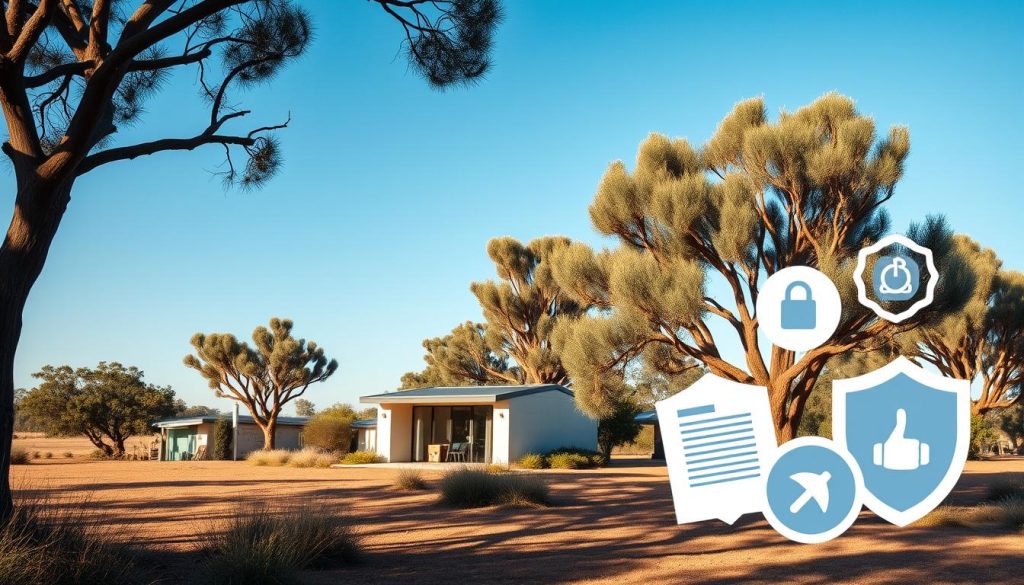Starting a small business in Australia is a unique challenge for American entrepreneurs. The Australian market is full of opportunities, but it also has its own set of challenges. These include cultural differences and local legal rules.
Understanding the business environment in Australia is key to success. This guide will help you prepare for the complexities of starting a business here. It will ensure you’re ready for the detailed guidelines and strategies in the following sections.
Understanding the Business Landscape in Australia

The Australian business scene is lively and full of opportunities. It’s a place where entrepreneurs and investors can thrive. With a strong focus on small businesses, it’s one of the best markets worldwide.
Small businesses are key to the economy, making up about 97% of all businesses in Australia. They drive innovation, create jobs, and boost the economy.
There are many trends shaping the economy today. It’s important for new business owners to keep up. The push for sustainability and digital change has brought new chances for businesses. It’s changing how people shop and what they want to buy.
Fields like tech, healthcare, and green energy are growing fast. Thanks to a stable economy and helpful government policies, small businesses can do well. There are many resources available, like funding, mentorship, and networking. Knowing about these can help you succeed in Australia’s business world.
Legal Requirements for Foreign Entrepreneurs

Starting a business in Australia means following certain legal rules. These rules are important for American entrepreneurs. They help avoid legal problems and make the process easier.
First, foreign entrepreneurs need the right visa. There are different visas, like the Business Innovation and Investment visa. This visa is for those who want to start or manage a business here. After getting a visa, you must get an Australian Business Number (ABN). An ABN is needed for taxes and business identity.
Also, you might need to register for Goods and Services Tax (GST) if your sales are high enough. GST lets you get back some of the tax you paid on things you bought. It also makes sure you follow Australia’s tax rules.
Knowing Australian consumer law is also key. It protects customers and ensures fair business practices. Following these laws makes your business more trustworthy. It also helps your reputation in Australia.
Starting a small business in Australia as an American

Starting a business in Australia is an exciting chance for American entrepreneurs. It’s important to know the legal rules and the different business types. This part talks about Australian laws and the business options for newcomers.
Navigating Australian Business Laws
Australia has many laws for businesses. Following these laws is key to avoid fines and run smoothly. It’s vital to understand how to register, get licenses, protect intellectual property, and follow workplace safety rules.
Types of Business Structures Available
Choosing the right business type is crucial for American entrepreneurs in Australia. The main types are:
- Sole Trader: Simple and cheap, where the owner has full control. Great for small businesses.
- Partnership: For two or more people. Partners share profits, duties, and risks, making it a team effort.
- Company: More complex, offering protection from personal liability. It might need more legal work.
Each structure has its pros and cons, affecting taxes, risks, and management. Entrepreneurs should think about their needs and goals when picking a structure.
Choosing the Right Business Structure

Starting a business in Australia means picking the right structure. The choice affects liability, taxes, and how you run the business. Knowing about partnerships, proprietorships, and corporations helps make a smart choice for your goals.
Partnerships, Proprietorships, and Corporations
Each business structure has its pros and cons. Let’s look at the main ones:
- Partnerships Australia: Partnerships have two or more people running a business together. They are easy to start and offer flexibility. But, partners risk their personal assets if the business owes money.
- Proprietorships: Sole traders have full control over their business. It’s simple to set up and has few rules. But, the owner is fully responsible for any debts or legal issues.
- Corporations in Australia: A corporation is a separate legal entity. It protects personal assets and limits liability. But, it comes with complex rules and costs, which might deter some.
Choosing the right structure depends on your goals, money, and risk tolerance. Think carefully about your situation to pick the best fit for your business.
Registering Your Business: Step-by-Step Guide

For Americans wanting to start a business in Australia, knowing the registration process is key. First, get an Australian Business Number (ABN). It’s vital for any business and helps with taxes. It also makes your business look good to clients and suppliers.
Next, think about your tax duties. If your business will make more than a certain amount, you need to register for Goods and Services Tax (GST). You can do this online at the Australian Taxation Office’s website.
After that, make sure you have all the legal papers ready. This includes:
- Business registration forms, filled out correctly.
- Proof of who you are and what your business does.
- Partnership agreements if your business has partners.
Remember, deadlines can change based on your business type. It’s important to know these dates. For help with registering your business in Australia, check out government websites. They offer lots of support during the process.
Market Research: Understanding Your Audience

For any small business in Australia, effective market research is key. It helps entrepreneurs know who their audience is and what they want. This way, products and services can meet market needs. Also, a detailed competitive analysis helps businesses find their place in the market.
Identifying Target Demographics and Preferences
To understand your audience, you need to know their habits, likes, and needs. Here are some ways to do this:
- Online surveys to get feedback from potential customers.
- Focus groups to hear what people think and feel.
- Social media analytics to see how people interact.
Using these methods helps businesses make products that people really want.
Conducting Competitive Analysis
Doing a deep dive into competitors is vital in Australia’s market research. This step looks at what others do well and what they don’t. Here’s how to approach it:
- Find out who your main competitors are.
- Look at how they market and engage with customers.
- Check their prices and what they offer.
This information shows where you can stand out and grow in your field.
Financial Considerations for Startups

Starting a business in Australia means understanding key financial points. American entrepreneurs need to get the hang of taxes and costs. Knowing your startup costs helps with budgeting and planning for growth.
Understanding Taxes and Compliance Costs
The Australian tax system has many layers that affect small businesses. Entrepreneurs must learn about Goods and Services Tax (GST), income tax, and state taxes. Costs like registration, annual filings, and consulting fees add up.
Ignoring these can lead to unexpected expenses. This can slow down your business.
Funding Options for Small Businesses
Finding the right funding is crucial for new businesses. In Australia, there are many funding options:
- Business loans made for startups
- Grants from governments and private groups for small businesses
- Investments from venture capitalists or angel investors in new companies
Looking into these options helps entrepreneurs face early challenges. It builds a strong base for future success.
Cultural Differences and Business Etiquette

For American entrepreneurs in Australia, knowing the local culture is key. Australian business culture values direct talk and respect. Open discussions are common, where being clear is more important than being diplomatic.
In Australia, business etiquette is laid-back, unlike in other places. Being on time is important, but there’s more room for flexibility than in the US. Building a personal connection is vital before starting business talks. Australians enjoy casual chats before getting down to business.
- Use first names early on, as it’s widely accepted.
- Keep eye contact to show you’re engaged and honest.
- Find the right balance between being professional and friendly. Australians like a good sense of humour.
Negotiation styles also vary. Australians often look for solutions that benefit everyone, not just one side. Knowing these differences helps in making business interactions smoother and more successful.
Building a Business Plan: Key Components

Creating a solid business plan is key for success. It acts as a guide for entrepreneurs, helping them navigate the start-up journey. A good plan includes several important parts that help shape your business strategy in Australia.
- Vision and Mission Statement: Clearly state your business’s purpose and values. This sets the direction for your organisation.
- Market Analysis: Know your target markets well. This means understanding demographics, preferences, and demand for your offerings.
- Financial Projections: Make realistic forecasts of revenue and costs. Outline your budget, pricing, and expected profits.
- Operational Plans: Explain how your business will run daily. This includes logistics, suppliers, staff, and technology needs.
- Executive Summary: Sum up your business plan’s key points. This is your first chance to impress investors or stakeholders.
Using templates can make planning easier. There are many resources to help create effective plans for different industries and markets. A well-thought-out business strategy in Australia can boost your chances of success.
Networking and Building Local Connections

Networking in Australia is key for foreign entrepreneurs wanting to make a mark. Building strong local connections can really boost your chances of success. It gives you access to valuable resources and insights.
Here are some effective ways to build a strong network:
- Go to industry events and conferences that fit your business. These are great chances to meet people who think like you and find mentors.
- Join local business groups or chambers of commerce. They host events and help businesses work together.
- Be part of networking groups, online or in person. Talking to local entrepreneurs can open up new business chances and create lasting friendships.
Networking does more than just connect you. It can lead to mentorship, partnerships, and insights into the market. These are crucial for doing well in your new business.
Marketing Your Small Business in Australia

Marketing in Australia needs a deep understanding of the local scene and what people like. Using smart marketing strategies can help your business get noticed. Social media is key, letting brands talk straight to their fans on different platforms.
Utilising Social Media Effectively
Platforms like Facebook, Instagram, and LinkedIn are great for promoting. Here are some tips to get the most out of them:
- Know who you’re talking to and make content they’ll love.
- Make your posts stand out with cool visuals and videos.
- Keep an eye on how well things are doing and tweak your plan.
- Ask your followers to share their own stories to build a community.
Incorporating Australian Content in Your Marketing
Using content that speaks to Australians makes your message hit home. It’s vital to use themes and references that locals can relate to. Here are some things to think about:
- Make sure to include local events and holidays in your campaigns.
- Spotlight local products or team up with Aussie influencers.
- Use language and sayings that are common in Australia.
- Share stories and reviews from Aussie customers.
Understanding Employment Laws and Hiring Staff

For American entrepreneurs in Australia, knowing employment laws is key. Following workplace regulations helps your business run smoothly. It also makes your workplace a better place for everyone.
First, it’s important to know about employee rights in Australia. Workers get things like leave, super, and safe work conditions. Knowing these rights helps you follow Fair Work laws.
Next, making good employment contracts is crucial. These should cover roles, pay, and other important details. A clear contract helps avoid future problems.
Also, it’s vital to follow minimum wage laws and pay rules. Australia has different wages for different ages and jobs. Paying fairly helps keep your team happy and loyal.
Finally, creating a positive work culture is essential. A good culture boosts morale and productivity. Hiring a diverse team can make your workplace even better.
In short, understanding employment laws and hiring well are key to success in Australia.
Insurance and Risk Management for Small Businesses

In Australia, small businesses need good insurance and risk management to protect their assets and reputation. There are many insurance options available, each suited to different needs.
- Public Liability Insurance: This coverage protects against claims made by the public for personal injury or property damage resulting from business activities.
- Professional Indemnity Insurance: Crucial for professionals, this insurance covers legal costs and compensation claims arising from negligence or failure to deliver services as promised.
- Workers’ Compensation Insurance: Mandatory for most businesses, it provides coverage for employees who may suffer injuries or illnesses at work, ensuring their welfare is paramount.
It’s important for businesses to manage risks well. They should do regular risk assessments to find weak spots. Then, they can take steps like safety training and planning for emergencies to get stronger.
Getting help from an experienced broker is a good idea. They can make sure your insurance fits your business well. This way, your business can grow safely.
Resources and Support for American Entrepreneurs in Australia
American entrepreneurs looking to start a business in Australia have many resources at their disposal. The Australian government has initiatives and grants to help with innovation and startups. The Business.gov.au platform offers guidance on compliance, funding, and resources for newcomers.
Local business support groups also play a big role. The Australian Small Business and Family Enterprise Ombudsman gives expert advice. Local chambers of commerce host events, mentorship, and workshops, helping entrepreneurs make connections and learn.
Online platforms are full of startup help, from free webinars to blogs on Australian market best practices. The Startup Australia initiative has information on funding, incubators, and industry insights. Using these resources can help American entrepreneurs succeed in Australia.
















